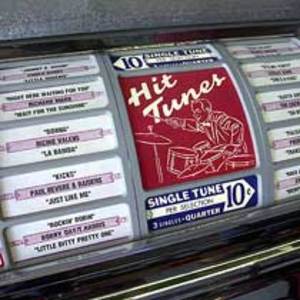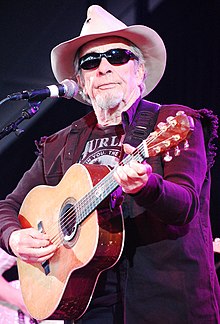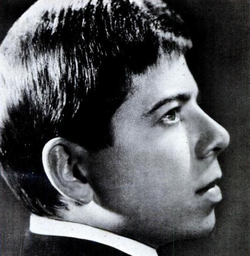Uploaded on Mar 14, 2008
hrtmike17
Merle Ronald Haggard (born April 6, 1937) is an American country music song writer, singer, guitarist, fiddler and instrumentalist. Along with Buck Owens, Haggard and his band The Strangers helped create the Bakersfield sound, which is characterized by the unique twang of Fender Telecaster and the unique mix with the traditional country steel guitar sound, new vocal harmony styles in which the words are minimal, and a rough edge not heard on the more polished Nashville Sound recordings of the same era.
By the 1970s, Haggard was aligned with the growing outlaw country movement, and has continued to release successful albums through the 1990s and into the 2000s. In 1997, Merle Haggard was inducted into the Oklahoma Music Hall of Fame.
| Merle Haggard | |
|---|---|
 Haggard at the White House for the 2010 Kennedy Center Honors |
|
| Background information | |
| Birth name | Merle Ronald Haggard |
| Also known as | The Hag |
| Born | April 6, 1937 Oildale, California, United States |
| Genres | Country |
| Occupations | Songwriter, musician, guitarist and singer |
| Years active | 1963–present |
| Labels | Capitol, MCA, Epic, Curb, ANTI, Vanguard |
| Website | merlehaggard.com |
| Notable instruments | |
| Merle Haggard Signature Model Telecaster | |
Early life
Merle Haggard was born in Oildale, California, in 1937. His parents, James Francis and Flossie Mae (née Harp) Haggard,[1] moved from Oklahoma to California during the Great Depression.At that time, much of the population of Bakersfield consisted of migrant workers from Oklahoma and surrounding states. Haggard spent his childhood in Oildale, a hardscrabble suburb of Bakersfield home to many workers in the adjacent Kern River Oil Field.
His maternal grandmother, Martha Arizona Belle "Zona" Villines Harp (1881-1971), is the subject of his 1972 hit "Grandma Harp."
Haggard's father died when Merle was nine years old. He soon began committing petty crimes and truancy. Due to shoplifting in 1950 (aged thirteen), Merle was sent to a juvenile detention center.[2]
In 1951, aged 14, Haggard ran away to Texas with a friend, but returned that same year and was arrested for truancy and petty larceny. Again escaping the juvenile detention center, he went to Modesto, California. He worked odd jobs—legal and not—and began performing in a bar.
Once he was found again, he was sent to the Preston School of Industry, a high-security installation. He was released fifteen months later, but was sent back after beating a local boy during a burglary attempt. After his fourth release, Haggard saw Lefty Frizzell in concert with his friend, Bob Teague.
After hearing Haggard sing along to his first two songs Frizzell allowed Haggard to sing at the concert. The audience enjoyed Haggard and he began working on a full-time music career. After he had earned a local reputation, Haggard's money problems caught up with him. He was arrested for attempting to rob a Bakersfield tavern in 1957[3] and was sent to the San Quentin state prison for three years.
While in prison, Haggard ran a gambling and brewing racket from his cell. During a time of solitary confinement, he encountered an alcoholic mathematician and death row inmate, Drunk Adam. Haggard had the opportunity to escape with a fellow inmate (nicknamed "Rabbit") but passed.
The inmate successfully escaped, only to shoot a police officer and return to San Quentin for execution. Drunk Adam's predicament along with that of "Rabbit" inspired Haggard to turn his life around.
Haggard soon earned a high-school equivalence diploma and kept a steady job in the prison's textile plant.
Haggard cited a 1958 performance by Johnny Cash as his inspiration to join the prison's band.[4] Upon his release in 1960, Haggard said it took about four months to get used to being out of the penitentiary and that, at times, he actually wanted to go back in. He said it was the loneliest he had ever felt.[citation needed]
Country success
Upon his release, Haggard started digging ditches and wiring houses for his brother. Soon he was performing again, and later began recording with Tally Records. The Bakersfield Sound was developing in the area as a reaction against the over-produced honky tonk of the Nashville Sound. Haggard's first song was "Skid Row".In 1962, Haggard wound up performing at a Wynn Stewart show in Las Vegas and heard Wynn's "Sing a Sad Song". He asked for permission to record it, and the resulting single was a national hit in 1964. The following year he had his first national top ten record with "(My Friends Are Gonna Be) Strangers", written by Liz Anderson (mother of country singer Lynn Anderson) and his career was off and running.
1966 saw his first number one song "I'm a Lonesome Fugitive", also written by Liz Anderson, which Haggard acknowledges in his autobiography remains his most popular number with audiences.
In 1968, Haggard's first tribute LP Same Train, Different Time: A Tribute to Jimmie Rodgers, was released to acclaim. "Okie From Muskogee", 1969's apparent political statement, was, according to some Merle Haggard interviews decades later, actually written as an abjectly humorous character portrait.
In one such interview, Haggard called the song a "documentation of the uneducated that lived in America at the time."[5] However, he said later on the Bob Edwards Show that "I wrote it when I recently got out of the joint. I knew what it was like to lose my freedom, and I was getting really mad at these protesters. They didn't know anything more about the war in Vietnam than I did. I thought how my dad, who was from Oklahoma, would have felt. I felt I knew how those boys fighting in Vietnam felt."
Later, Alabama Gov. George Wallace asked Haggard for an endorsement, which Haggard declined. However, Haggard has expressed sympathy with the "parochial" way of life expressed in "Okie" and songs such as "The Fightin' Side of Me". After "Okie" was released, it was a hit.
Regardless of exactly how they were intended, "Okie From Muskogee", "The Fightin' Side of Me", and "I Wonder If They Think of Me" were hailed as anthems of the so-called "Silent Majority" and presaged a trend in patriotic songs that would reappear years later with Charlie Daniels' "In America", Lee Greenwood's "God Bless the USA", and others.
In 1969 the Grateful Dead began performing Haggard's tune "Mama Tried", which appeared on their 1971 eponymous live album. The song became a staple in their repertoire until the band's end in 1995. The Grateful Dead also performed Haggard's "Sing Me Back Home" numerous times between 1971 and 1973. In addition, the Flying Burrito Brothers recorded and performed "White Line Fever" in 1971, and toured with "Sing Me Back Home" and "Hungry Eyes".
Singer-activist Joan Baez, whose political leanings couldn't be more different from those expressed in Haggard's above-referenced songs, nonetheless covered "Sing Me Back Home" and "Mama Tried" in 1969.
The Everly Brothers also used both songs in their 1968 country-rock album Roots. Haggard's next LP was A Tribute to the Best Damn Fiddle Player in the World (or, My Salute to Bob Wills), which helped spark a permanent revival and expanded audience for western swing.
On Tuesday, March 14, 1972, shortly after "Carolyn" became another number one country hit for Haggard, then-California governor Ronald Reagan granted Haggard a full pardon for his past crimes.
During the early to mid 1970s, Haggard's chart domination continued with songs like "Someday We'll Look Back", "Carolyn", "Grandma Harp", "Always Wanting You", and "The Roots of My Raising".
He also wrote and performed the theme song to the television series Movin' On, which in 1975 gave him another number one country hit. The 1973 recession anthem "If We Make It Through December" furthered Haggard's status as a champion of the working class. Haggard appeared on the cover of TIME on May 6, 1974.
In 1981, Haggard published an autobiography, Sing Me Back Home. That same year, he alternately spoke and sang the ballad The Man In the Mask. Written by Dean Pitchford (whose other output includes Fame, Footloose, Sing, Solid Gold and the musical Carrie), this was the combined narration/theme from the movie The Legend of the Lone Ranger...which was a box-office flop.
Country star Willie Nelson believed the 1983 Academy Award-winning film Tender Mercies, about the life of fictional singer Mac Sledge, was based on the life of Merle Haggard. Actor Robert Duvall and other filmmakers denied this and claimed the character was based on nobody in particular. Duvall, however, said he was a big fan of Haggard.[6]
"If We Make It Through December" turned out to be Haggard's last pop hit. Although he won a Grammy Award for Best Male Country Vocal Performance for 1984's new kind of honky tonk, newer singers had begun to take over country music, and singers like George Strait and Randy Travis had taken over the charts.
Haggard's last number one hit was "Twinkle, Twinkle Lucky Star" from his smash album Chill Factor in 1988.[citation needed]
In 1989, Haggard recorded a song, "Me and Crippled Soldiers Give a Damn", in response to the Supreme Court's decision to allow flag burning under the First Amendment. After CBS Records Nashville avoided releasing the song, Haggard bought his way out of the contract and signed with Curb Records, which was willing to release the song. Of the situation, Haggard commented, "I've never been a guy that can do what people told me...It's always been my nature to fight the system."[7]
Influence
Haggard's guitar playing and voice gives his country a hard-edged, blues-like style in many cuts. Although he has been outspoken in his dislike for modern country music, he has praised George Strait, Toby Keith and Alan Jackson.Keith has singled Haggard as a major influence on his career. The Youngbloods responded to "Okie from Muskogee" with "Hippie from Olema", in which, in one repetition of the chorus, they change the line "We still take in strangers if they're ragged" to "We still take in strangers if they're haggard".
Nick Gravenites, of Big Brother and the Holding Company, paid Haggard a tongue-in-cheek tribute with the song, "I'll Change Your Flat Tire, Merle," later covered by other artists including Pure Prairie League.
The Dixie Chicks paid tribute by recording Darrell Scott's song "Long Time Gone", which criticizes Nashville trends: "We listen to the radio to hear what's cookin’/But the music ain't got no soul/ Now they sound tired but they don’t sound Haggard," with the following lines mentioning Johnny Cash and Hank Williams in the same vein. Collin Raye paid him tribute with the song "My Kind Of Girl", when he sang "How 'bout some music/ She said have you got any Merle/ That's when I knew she was my kind of girl."
In 2000, Jackson and Strait sang "Murder On Music Row," which criticizes mainstream country trends: "The Hag wouldn't have a chance on today's radio/ Because they committed murder down on music row."
In 2005, the country rock duo Brooks & Dunn sang "Just Another Neon Night" off their Hillbilly Deluxe album. In the song Ronnie Dunn said "He's got an Eastwood grin and a too early swagger/Hollerin' turn off that rap/And play me some Haggard". Brooks & Dunn also reference Haggard in 1993's "Rock My World (little country girl)" off their Hard Workin' Man Album as they sing "Acts like Madonna but she listens to Merle/ Rock my world little country girl."
In 2005, Shooter Jennings mentioned him in the title track of his album Put the "O" Back in Country and later mentioned him in 2007 in his song "Concrete Cowboys."
In 2006, Hank Williams III included Haggard as well as other country icons in the song "Country Heroes". Steve Goodman mentioned him, humorously but respectfully, in the song "You Never Even Called Me By My Name" (which he either co-wrote or didn't co-write with John Prine).
George Jones recorded two albums with him (Merle) and mentions "The Okie from Muskogee" in his song "Who's Gonna Fill Their Shoes". Lynyrd Skynyrd's song, "Railroad Song", references Haggard, "Well I'm a ride this train Lord until I find out/ What Jimmie Rodgers and the Hag was all about".
They also performed both a cover of "Honky Tonk Night Time Man" as well as their own take on the song with "Jacksonville Kid" (found on the 2001 CD reissue of the album) on the album, Street Survivors.[citation needed]
In 2006, Haggard was back on the charts in a duet with Gretchen Wilson, "Politically Uncorrect".[8] He is also featured on "Pledge Allegiance to the Hag" on Eric Church's debut album.
Source: Wikipedia
TTFN
CYA Later Taters
Thanks for watching.
Donnie/ Sinbad the Sailor Man






